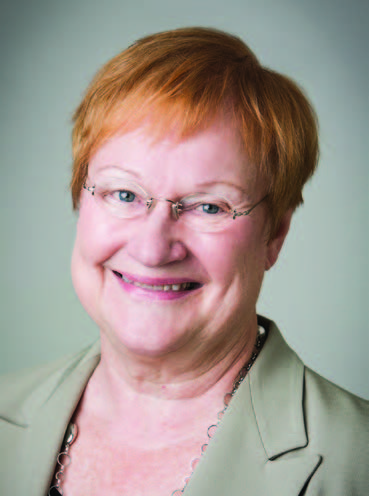Article by Tarja Halonen, the former President of Finland, co-chairs the High-Level Task Force for ICPD (International Conference on Population and Development). She has also served in numerous capacities in international forums, including as co-chair of both the Millennium Summit and the UN Secretary-General’s High-level Panel on Global Sustainability.
OP-ED: We Need Everyone to Build a More Sustainable World
- OP-ED: We Need Everyone to Build a More Sustainable World
Last week, I had the privilege of attending the Delhi Sustainable Development Summit, an annual event that deals with a subject that is very close to my heart. The summit gathered together amazing people: Nobel Prize winners, thought leaders, heads of state, corporate innovators, and academicians to deal with the paramount challenges of the 21st Century all focused on three pressing dimensions of sustainability: food, water and energy.
Clearly these will are critical to the future of humanity. Right now, about one in eight of the human beings with whom we share this planet lives without adequate drinking water. Almost that many lack food security. And nearly one in five people manage without the additional power and options that electricity affords.
How to meet current needs, without compromising the prospects of generations who will follow, is a very complicated issue.
It was encouraging to see so many brilliant and committed scientists, economists and development specialists working so hard on the innovations and ideas that can help us produce, distribute and use precious resources more efficiently and equitably.
Their work is essential because it will take all of us working with our unique capacities to solve the really difficult challenges ahead.
But from my perspective, it is also critically important to empower the very people who grapple with these issues every day: the girls who dream of a better future as they carry water over long distances, the women who toil over inefficient and polluting cookstoves, and the small farmers who manage to produce 70 percent of the world’s food far more sustainably than larger concerns.
We need to stay focused on solutions that keep these people at the forefront of our decision-making — because it is their individual choices that will ultimately have a pivotal role in how our common future unfolds. When individual rights are fully respected, and when people are placed at the center of development, solutions have an inherent sustainability.
Something learned from my own country and our Nordic sisters is that healthy and productive societies generate a self-sustaining circle of greater well-being and productivity. Inequality and the exclusion of women, young people, and the poor, in contrast, undermine health, wellbeing and economic growth.
Although we need everyone’s contributions to solve the global problems we face, the full talents and capabilities of women remain untapped in many countries. It’s not that women aren’t working hard. Indeed, they are working overtime as food producers, preparers, sellers and consumers, as mothers and nurturers, as water bearers and as custodians of family hygiene.
And this is often without the benefit of time-efficient technologies and energy services – or modern forms of contraception, for that matter. This means that women are often overburdened in terms of reproduction as well as production.
The sad fact is that women work more hours than men and produce half of the world’s food. Yet they earn only a fraction of the world’s income and own a small share of the world’s property.
Women are managing to ensure food for so many. Therefore they need proper training, equipment and rights to land. They need to be able to participate in the economy and they most definitely need access to sexual and reproductive health services, as related health issues disproportionately affect women – from complications of pregnancy and childbearing to the HIV epidemic.
Gender-based violence takes another huge toll. What if the full potential and power of women were unleashed? Imagine what they could accomplish.
We need to invest in the empowerment of women to achieve the kind of transformations that can sustain economic growth, preserve the environment, foster resilience and leave no one behind. And we need to invest in sexual and reproductive rights for all, including for the next generations, if we are to achieve truly sustainable development.
Women are keenly attuned to the requirements of sustainability. When they have control and freedoms over their own sexual and reproductive lives, women tend to choose healthier and smaller families that can be more resilient to crises, displacement or environmental challenges, and can relieve local population pressures on limited resources and fragile ecosystems.
That’s why it’s critically important that the next framework for international development – the global agenda that will replace the Millennium Development Goals after 2015 – deals squarely with gender equality and sexual and reproductive rights for all. These issues go right to the heart of sustainability. I remain committed to making sure they are not overlooked.


No comments:
Post a Comment